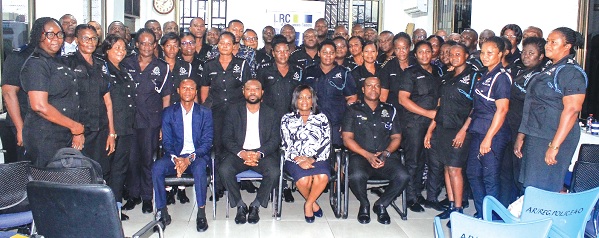
Prosecutors urged to study plea bargaining law
Police prosecutors have been advised to equip themselves with the provisions on the new plea bargaining in the Criminal and Other Offence (Procedure) (Amendment) Act, 2022 (Act 1079).
Advertisement
This would help them have a better understanding of the new plea bargaining law and thus enable them play their role in the administration of justice more effectively.
A Chief State Attorney at the Attorney-General’s Office, Evelyn Daawee-Keelson who gave the advice said having a firm understanding of the provisions would greatly help the police prosecutors in the discharge of their duties and ensure that the objective for which the law was made was achieved.
What is plea bargaining?
On July 22, 2022, the President, Nana Addo Dankwa Akufo-Addo passed a bill to introduce plea bargaining into Ghana’s justice system for some cases.
Plea bargaining is a process in criminal justice where an accused person relinquishes the right to a full trial in exchange for some other benefit.
In consideration of a guilty plea, the accused person gets lesser charges, reduced number of offences, or receives a lesser sentence.
Training
Mrs Dawee-Keelson gave the advice during a capacity building for 120 police prosecutors under the Accra Regional Police Command to equip them to execute their duties and enhance the judicial justice system in the country.
The participants, grouped into two batches, were taken through a two-day capacity training on the new plea bargaining law of Ghana, the limits of Police prosecutors in criminal trials, courtroom etiquette, drafting an effective witness statement and charge sheet.
The training was organised by the Legal Resources Centre with support from the Open Society Initiative for West Africa (OSIWA) under a project dubbed “Improving Criminal Justice and the Adminstration of Justice through advanced Technology Solution solutions”
Mrs Daawee- Keelson, who is also a part-time lecturer in Criminal Procedure at the Ghana School of Law, stated that the Attorney General would soon come out with guidelines that would help prosecutors and facilitate the process.
She stressed that until then, police prosecutors who think plea bargaining in a case they were handling would be more useful to the state or who were approached by lawyers or accused persons to enter into plea bargaining, would have to engage their superiors who would advise with input from the Attorney-General
The arrangement, she explained, was to ensure transparency and for uniformity.
“Feel free to consult.
You can come to the office with your docket if you have any challenge in court”, she said.
Exemptions
A Principal State Attorney at the AG’s Office, Richard Gyambibi, said Act 1079 does not allow for plea bargain in all criminal offences as offences such as treason, high treason, genocide, rape, defilement, robbery and kidnapping are exempted.
Other offences not covered by plea bargaining are attempted murder, abduction, piracy and hijacking, and an offence related to public elections.
A Programmes Officer at the Legal Resource Centre (LSC), Enoch Jengre, said the Centre was a non-governmental organisation that develops human rights capacities within communities and works with state institutions to ensure social progress and development access to justice and minimizing crime and enhancing good governance.
LSC, he said, was also the implementing agency for the USAID Justice Sector Support Activity which focuses on monitoring and sustaining the implementation of Ghana`s Case Tracking System (CTS) that employs technology solutions to track criminal cases from inception until they are disposed of in 40 districts in seven regions.
It is also behind the justice for children initiative that facilitates and supports actions aimed at promoting, protecting and developing the rights of children in Ghana.
LSC was also involved in the e-justice initiative which was to ensure the effective integration of ICTs in the delivery of justice to help free up the clogged justice system.
The head of legal and prosecutions at the Accra Regional Police Command, Chief Superintendent of Police, Elorm Donald Bani, said the training would build the capacity of the police prosecutors on legal processes to follow in criminal process and educate them on recent changes in the law.




